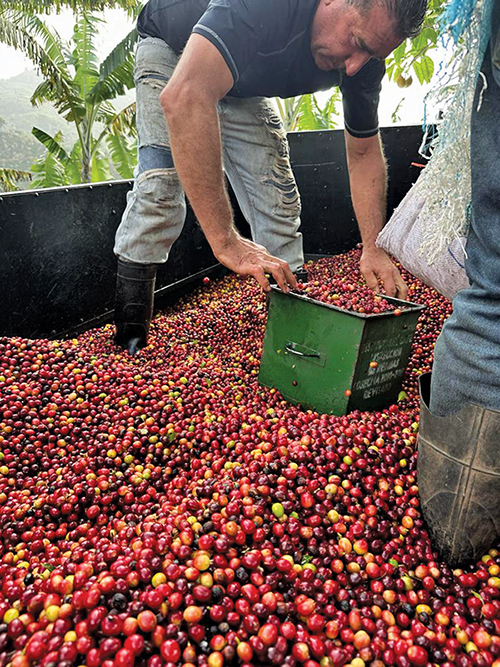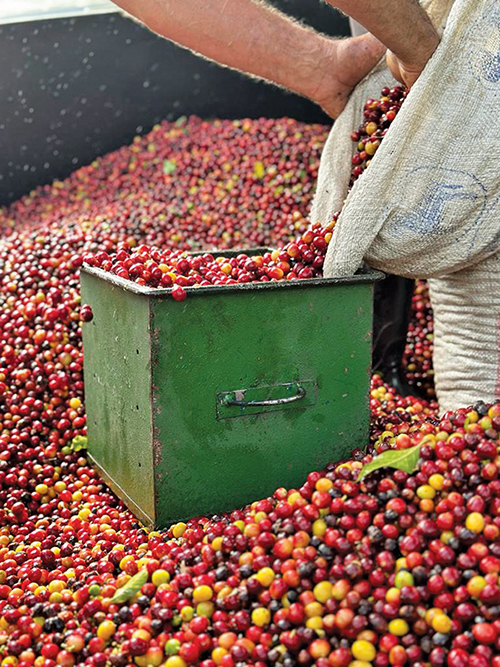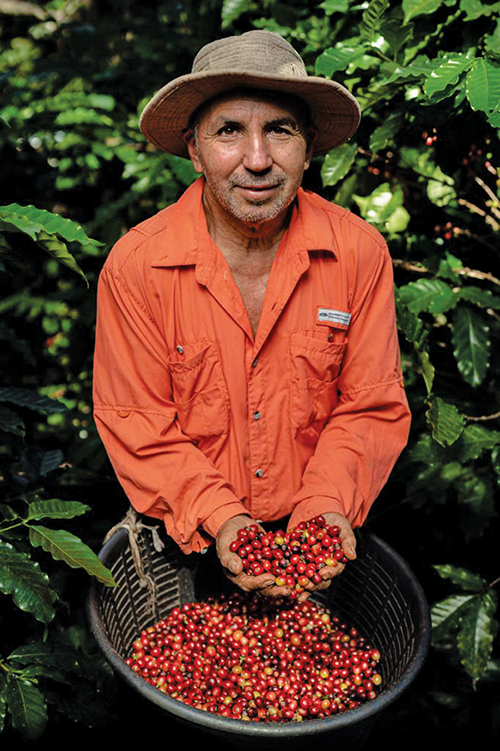Join us for an evening of education about the coffee industry on Jan. 25 at 7 p.m..

I was first introduced to specialty coffee in 2017 while I was working for a startup incubator. I had met a small business owner who roasted and sold his coffee beans at his coffee shop in Virginia, Commonwealth Joe. Robbie, the business owner, sourced his beans from Latin America and Ethiopia and, together with his mother, roasted them in his shop near Washington, DC. Robbie had piqued my interest in understanding what “good” coffee is and where it comes from, how it’s grown, harvested, processed and roasted. In the years since, I’ve gathered more knowledge about specialty coffee, enjoyed countless visits to coffee shops around the world, tasted various types of specialty coffee beans, and fostered an appreciation for this incredible fruit that God created for us.
Specialty coffee is a category that refers to the most premium of beans which are treated with care and attention. Each bean is graded by the Specialty Coffee Association, an international trade organization for coffee professionals, on a 100 point scale for quality, texture and flavor. Specialty coffee must hit 80 points or higher: The higher the score, the more outstanding the coffee. For example, if you’ve already tasted our coffee you can attest to its delicious and smooth taste. That flavor comes from beans grown on local organic farms in Costa Rica. On the SCA scale, our coffee has a score of 84-86.

The specialty coffee trade is extremely human centric; it focuses on sourcing coffee beans from farmers who have been perfecting their trade for generations. Coffee grows differently depending on altitude, climate, soil and sun. The farmers pass down knowledge on how that affects the coffee fruits within their region. With specialty coffee, each coffee fruit is hand-picked at peak ripeness, one cherry at a time. Then the growers, with their vast knowledge of their crop, sort and process the fruit to expose the bean using the method which will bring out its unique flavor characteristics. There are different processing methods, and each method will yield a different result in the taste of the coffee.
Commodity coffee, which is used by most coffee shop chains and is sold at supermarkets, uses machinery to harvest the coffee fruits in bulk, not accounting for unripe or unready selections. With this type of coffee, the quality control is minimal. The beans are roasted to a uniform crisp to cover any faulty or spoiled beans in the batch. This is not the case with specialty coffee. After being processed, each bean is sorted and graded according to the SCA’s criteria. Then, a roaster who is highly trained on various coffee flavor profiles roasts the green coffee according to the temperature that best fits the country of origin, the elevation, the variety and how it has been processed. The roaster will dictate what kind of characteristics will shine through. Finding the ideal roasting level for each coffee is a skill that takes years to master. While the roasting process for one batch takes an average of 11 minutes, it also requires constant check-ins to see how the roast is developing. A human touch at every point.
With coffee, the higher the quality the higher the cost. The cost of specialty coffee is based on the processing, transportation, and the roaster’s operating costs. Most specialty coffee is roasted outside of the country of origin where it’s sold to local consumers. This means that profitability for farmers is very opaque. So while we may buy a bag of specialty coffee beans at retail for $21-$26, the farmers may see only .01% of that. The effort and money that the farmers invest in producing quality coffee is not matched by the price they receive for it. Today, many roasters in the industry are working towards creating a more sustainable and truly fair coffee trade. They are selling their coffee at higher costs in order to give more to the farmers. More expensive coffee means that the coffee producers gain more for their hard work.

Our beans are roasted by the team at Buena Vida Cafe Organico, whose mission is to revolutionize the coffee trade by focusing on sustainability and higher prosperity for coffee producers. While it’s easy to just grab a bag off the shelf from your local grocery store or pick up a cup from a familiar coffee shop chain, investing your time and money into enjoying specialty coffee makes you a part of a more wholesome and moral community. But simply, it just tastes so much better.
What I’ve described above is only the tip of the iceberg when it comes to understanding specialty coffee. If you’re interested in learning more about this industry and about coffee, we welcome you to join us for an educational evening at our cafe where you will get a chance to taste different varieties of coffee, using various brewing methods, and learn more about the cup you drink and why it matters. Join us on January 25 at 7 p.m..
Cafe Demi is located at 1400 Palisade Ave, Teaneck.
Miriam is co-owner at Cafe DeMi. Having started her career at a fast growing start-up, she learned the dos and don’ts of starting your own business and how to achieve a balance of creativity, agility and stability. Her skill for understanding and implementing customer needs has been sought out by employers, gaining her years of experience working in various settings, including the hospitality industry. Miriam moved to Teaneck to open Cafe DeMi and has been loving getting to know the local community.












